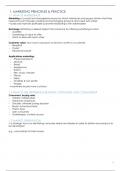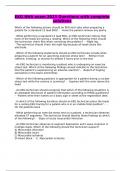Samenvatting
Samenvatting Marketing
- Vak
- Instelling
Dit document is jouw ultieme gids voor het vak Marketing. Het bevat de volledige lesnotities aangevuld met diepgaande uitwerkingen uit het cursusboek, zorgvuldig gestructureerd per onderwerp. Van marketingstrategieën en marktonderzoek tot consumentengedrag en merkmanagement—dit document geeft je...
[Meer zien]





